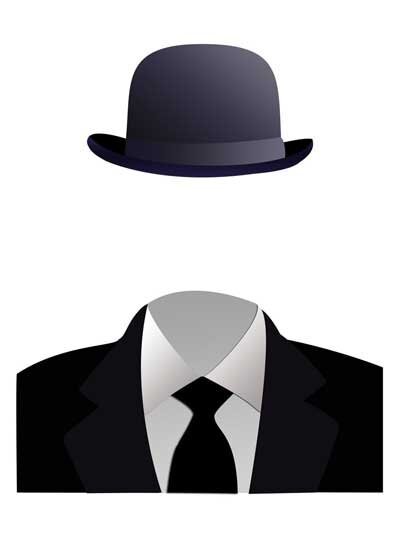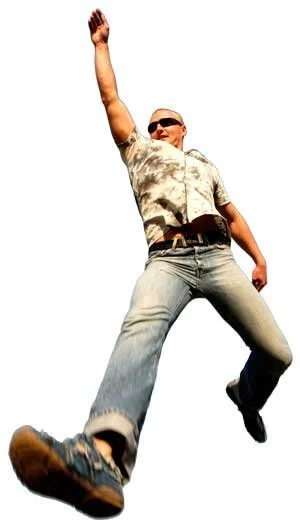Your most invisible ally
Beauty soon grows familiar to the lover, Fades in his eye, and palls upon the sense.
Joseph Addison, Cato, A Tragedy (1713)
What’s the most familiar object in your universe?
Hint: It’s not your smart phone. It’s not your running shoes. It’s not your favorite coffee cup.
It’s something that’s been with you right from the very moment of your conception. That’s right. The most familiar object in your universe, hands down, is your body.
This may well seem to be a trivial observation and hardly worthy of reflection. But this familiarity has enormous consequences for how we live and how we experience our lives. It even has a lot to do with the trajectory of our health.
The problem begins with our nervous system. The human brain is highly sensitive contrast and it’s particularly attentive to novelty. Naturally, this makes perfect sense in terms of human evolution; when you’re trying to make your way in a dangerous, predator-rich environment, you’ll want to know what’s new and different. An unusual sound, sight, smell or texture might tip you off that a dangerous carnivore or hunting opportunity is nearby; ancestors who noticed novelty were more likely to survive and pass their genes into the future.
The same holds true in the modern world. As we learn new skills and habits, novelty displaces familiar, learned qualities. In this process, we push our familiar experience down into deeper layers of brain and body; the familiar becomes increasingly less visible. Once we master an experience, sensation, or movement, we unconsciously file it under “the known” and move on to new challenges. Over time, the familiar begins to fade from consciousness and we become blind to what we know.
This is even the case with our own sense of physicality. When we’re infants, the body is a source of endless fascination; every little thing about it is new and interesting. We spend hours exploring our movements, sensations and experiences. The novelty is awesome and since we’re growing so fast, there’s always some new physical sensation or capability to explore. But after a couple of decades, the growth of the body begins to plateau and is no longer a source of surprise and fascination. It becomes so thoroughly familiar, we scarcely even notice it, except in cases when something goes haywire. The awe begins to fade and even worse, our physicality begins to disappear from the radar of our attention. For many sedentary people in the modern world, the body becomes very nearly invisible.
This “body blindness” may well be considered a disease state in its own right; as we loose touch with our physicality, we simultaneously lose our ability to give our bodies what they need. We stop exercising. We stop eating right. We stop paying attention to the subtle signals that would normally guide us towards healthier living. In a sense, our hyper-familiarity with ourselves may even pave the way for other, more widely-recognized lifestyle diseases such as obesity, diabetes, heart disease and even depression.
The consequences are devastating, not just to individuals, but to public health at large. As our increasing familiarity lulls us to sleep, we begin to see the body, not as an ally in our quest to love life’s experience, but rather as a treacherous, unpredictable alien, even a traitor. Things just happen to our bodies, you know. We “get” a disease. We “get” obesity.” We “get” impulses, cravings and unexplainable sensations. Shit just happens.
Even worse, our hyper-familiarization leads us towards a devaluation of the body. As our physicality fades from our attention, we are more likely to consider the body in utilitarian terms. The body serves a function and as long as it continues to serve that function, we can safely ignore it. The body is simply a locomotor device for the head; as long as it get us from one computer terminal to another, we’ll be OK. The body has no particular value outside its mechanical function; it’s not something to be celebrated and experienced, but something to be repaired.
So what are we to do about this creeping epidemic of hyper-familiarity and body blindness? How are we to rediscover the awe of living in and with this most marvelous creation?
To begin, we might well say that we need to defamiliarize ourselves with ourselves and rediscover the novelty and beauty of our physical experience. Here we can take a lesson from the world of art. Defamiliarization is the artistic technique of presenting to audiences common things in an unfamiliar or strange way, in order to enhance our perception of the familiar. The term was first coined in 1917 by Russian writer Viktor Shklovsky in an essay “Art as Device.”
Like artists who try to keep their attention alive, we too can refocus our attention on the nuances of our physicality. This is where mindfulness comes into play. When we pay more attention to our bodies and our physicality, we bring our experience out of the darkness of habit, back into the light. By feeling our sensations more completely, we reawaken our physical mindfulness and put ourselves back on the path to health.
Exercise plays an essential role here, especially when we focus on feeling and sensation. Vigorous physical movement stirs up our familiar experience and wakes up our attention. Diversity and variation are essential, of course. If we simply do the same exercise routine over and over again, we will simply fall back into the trap of the familiar. If we simply mount the treadmill with a magazine, iPod and TV, we simply put ourselves on the path to physical blindness.
A better approach is to strip away the externalities, the distractions and even the motivators. Slow down. Feel what you’re feeling when you move. Start with stillness, then add a single movement, as if you’re playing one note on a musical instrument. Bring all of your attention to bear on the instant of that creation. Integrate all of your physical-emotional-spiritual capability into the doing of that act. Forget about performance; focus on feeling.
Similarly, we can promote our physical mindfulness by using our bodies in different ways in daily living. Use your non-dominant hand for everyday tasks. Rake the leaves and shovel your driveway with the opposite side of your body. Wear different clothes and shoes. Walk on different terrain. Move your furniture around. Keep adapting to new environments. Do something different.
What we need are physical wake up calls, moments in our lives that are physically novel, surprising and attention-grabbing. So get out of whatever rut you happen to be in. Diversify your physical experience. Play a new sport, move in a new way. In the process, you'll find that your body will become an intimate friend and a powerful ally.
Whatever you do, keep waking up.

